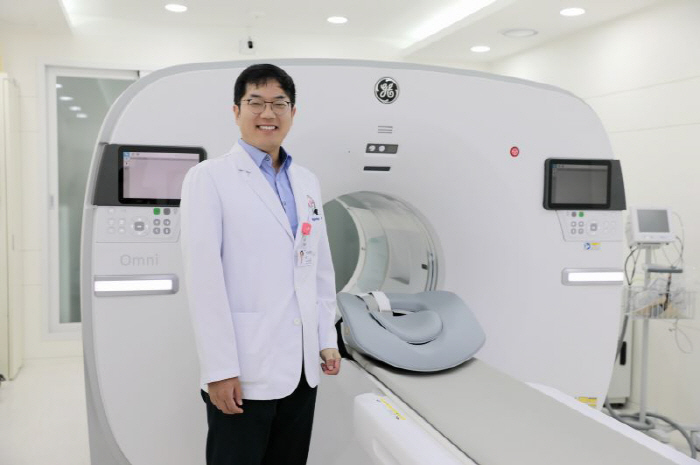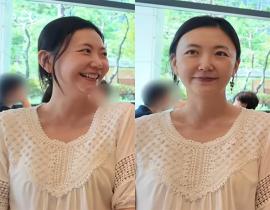AI diagnoses cancer and dementia risk in just 5 minutes...Hallim University Gangnam Sacred Heart Hospital Introduces 3rd Generation Digital PETCT
Sep 15, 2025
Hallym University Gangnam Sacred Heart Hospital (Hospital Director Lee Dong-jin) has introduced and is operating the latest digital PET-CT equipment with only four units in Korea.
Compared to the existing analog PET-CT, this equipment has improved image sensitivity by more than six times, and it is equipped with AI-based image correction and quality improvement functions to greatly increase the accuracy of cancer metastasis diagnosis. In addition, AI analysis can quickly and precisely analyze the risk of developing dementia in just 5 minutes.
Existing PET-CT tests had a burden of patient exposure due to the administration of radioactive drugs, but this equipment has greatly improved sensitivity, reducing patient radiation exposure by half and halving test time.
In addition, it is possible to more accurately determine whether amyloid protein deposition is necessary to administer dementia drugs (lecanemab, etc.), which have recently attracted attention. In the past, clinical application was difficult because the analysis took more than 12 hours, but quantitative numerical results were derived in only 5 minutes using the AI analysis program for the third generation digital PET-CT. Accordingly, it can be used as a key indicator to quickly and objectively determine whether dementia patients are administered drugs.
In actual cases, lung nodule lesions, which were not identified with previous equipment, were clearly found in this third-generation digital PET-CT test. As AI corrected image shaking due to breathing and improved quality, lesions that previously appeared as two could be clearly identified as one nodule.
Professor Lee Seok-hyun of the Department of Radiology said "3rd generation digital PET-CT is a patient-friendly device that makes the quality of images clear and reduces the burden on patients" and "Early detection will be a major turning point in the diagnosis of cancer and dementia that determines the success or failure of treatment" "If you have a family history such as cancer, dementia, or Parkinson's disease or have symptoms of memory impairment, you can expand your treatment opportunities through early screening," he explained.
Professor Lee Seok-hyun won the 'Young Researcher Award' for a study comparing the performance of Grad-CAM-based CNN and Transformer models when diagnosing bone metastases in bone scanning using AI technology. In addition, it recently obtained a 'Korean manuscript editor certificate' organized by the Korean Science Journal Editor's Council. This qualification is mainly obtained by biology majors, and it is the first time a nuclear medicine specialist has obtained it.
Hallim University Gangnam Sacred Heart Hospital operates a multidisciplinary treatment system such as internal medicine, surgery, radiology, and hematologic oncology, and provides a 'Fast Track' service from initial diagnosis to treatment of cancer to help patients quickly treat and recover.
Compared to the existing analog PET-CT, this equipment has improved image sensitivity by more than six times, and it is equipped with AI-based image correction and quality improvement functions to greatly increase the accuracy of cancer metastasis diagnosis. In addition, AI analysis can quickly and precisely analyze the risk of developing dementia in just 5 minutes.
Existing PET-CT tests had a burden of patient exposure due to the administration of radioactive drugs, but this equipment has greatly improved sensitivity, reducing patient radiation exposure by half and halving test time.
In addition, it is possible to more accurately determine whether amyloid protein deposition is necessary to administer dementia drugs (lecanemab, etc.), which have recently attracted attention. In the past, clinical application was difficult because the analysis took more than 12 hours, but quantitative numerical results were derived in only 5 minutes using the AI analysis program for the third generation digital PET-CT. Accordingly, it can be used as a key indicator to quickly and objectively determine whether dementia patients are administered drugs.
In actual cases, lung nodule lesions, which were not identified with previous equipment, were clearly found in this third-generation digital PET-CT test. As AI corrected image shaking due to breathing and improved quality, lesions that previously appeared as two could be clearly identified as one nodule.
Professor Lee Seok-hyun of the Department of Radiology said "3rd generation digital PET-CT is a patient-friendly device that makes the quality of images clear and reduces the burden on patients" and "Early detection will be a major turning point in the diagnosis of cancer and dementia that determines the success or failure of treatment" "If you have a family history such as cancer, dementia, or Parkinson's disease or have symptoms of memory impairment, you can expand your treatment opportunities through early screening," he explained.
Professor Lee Seok-hyun won the 'Young Researcher Award' for a study comparing the performance of Grad-CAM-based CNN and Transformer models when diagnosing bone metastases in bone scanning using AI technology. In addition, it recently obtained a 'Korean manuscript editor certificate' organized by the Korean Science Journal Editor's Council. This qualification is mainly obtained by biology majors, and it is the first time a nuclear medicine specialist has obtained it.
Hallim University Gangnam Sacred Heart Hospital operates a multidisciplinary treatment system such as internal medicine, surgery, radiology, and hematologic oncology, and provides a 'Fast Track' service from initial diagnosis to treatment of cancer to help patients quickly treat and recover.
|
This article was translated by Naver AI translator.














